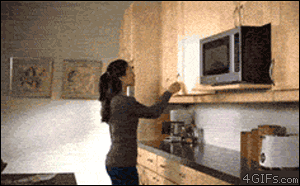6 Things Sellers Do That Real Estate Agents Hate
When you’re selling your home, you usually have your eye on two prizes: Getting it sold fast and getting a sweet price. And who knows how to sell the awesomeness of your home better than you? After all, you’re familiar with all of its best features—even those that might not be immediately apparent to potential buyers.
Before you get too involved, let us offer a word of caution: Your real estate agent loves your zeal for a good deal. But if you get in the way, you’ll do more than just irritate your agent—you could end up sabotaging the whole sale. Got it?
Here are six things home sellers do that drive their agents absolutely bonkers.
———
1. Sticking around for the show

So be sure to let your agent do his thing, and you do yours. By staying out of the picture during showings.
“Buyers already have apprehension about touring a stranger’s property,” says Peter Boscas, owner of Red Cedar Real Estate in Washington, DC. “That anxiety is ratcheted up when the sellers are home during the tour. [Buyers] feel like they’re intruding.”
We know you want to tell potential buyers all about how great your house is, what areas are best for sunsets, and how the acoustics in your great room are perfect for movie night. But suppress the urge and take a walk, friend.
“I’ve had dozens of experiences where the buyers wanted to leave immediately because of the seller’s presence,” Boscas says.
2. Overhyping upgrades

New “plush carpeting isn’t that important to someone with allergies who wants hardwood floors,” says Melanie McShane, a real estate broker in Arcadia, CA.
Likewise, you might want to push those new heated bathroom floors in the listing because you think they’re great, but buyers could see them as a costly feature to maintain.
“Everyone always thinks their home is worth more for some reason, but that’s up to buyers to decide, not sellers,” McShane says.
3. Promising repairs, but not following through

“Sometimes sellers will say they plan to repair the air conditioner, the tile counter, and a broken screen,” McShane explains. “They tell that to a prospective buyer, and it becomes an expectation.”
But what if all those repairs are expensive, and you change your mind? Then you’re leaving your agent to clean up the mess, especially if the buyer included those repairs in an offer.
“We potentially lose a deal or have to put pressure on our client to pay for something,” McShane says. “Then we have an upset client.”
4. Giving agents no room to breathe

Sellers “who require your undivided attention constantly throughout the day, every day, with little regard or thought as to how many other items you might be dealing with outside of their needs” can wear an agent down, says Josh Myler, residential division director for The Agency in Beverly Hills, CA.
It’s like inexhaustibly texting someone after the first date: You’re not going to get a better result. So put the phone down and take a deep breath. It’s all going to be OK.
5. Leaving a mess

Aside from sellers sticking around during showings, most of our experts say having a messy house is one of the biggest things that irk them. The home may have been expertly staged and the photos professionally taken, but it’s still your responsibility to keep the place neat. You don’t have to get all OCD about it. But you have to maintain order and a reasonable amount of cleanliness in every room.
“Some owners think, ‘Well, great. The photos are done, and now I don’t have to keep the place clean, pick up after myself, and I can just leave crap everywhere,” says agent Ryan Pertile of Downtown Resource Group in Minneapolis, MN.
But failure to do so can make your house look like it’s worth less than it’s on the market for, or make your agent feel obligated to run around doing a quick sweep before showings.
6. Getting greedy

You eye that offer on the table. It’s perfectly reasonable, but you know the house down the block is selling for $10,000 more. Your eyes narrow as you slowly push the offer away, waiting for a better one to come along.
“If I list a home and just days later we have a really good offer on the table, if doesn’t mean we should hold out for more offers. It means we priced the property correctly,” says Jennifer Sandlin, a real estate agent with Cornerstone Real Estate in Boston. “I typically try to tell sellers they should expect offers to come in around a range of pricing close to asking.”
Similarly, if you agree on a price and list your home, but another home pops up for a higher asking, resist the urge to relist your home at a higher value.
“How do you know that agent is pricing that other home properly?” Pertile asks.
And really, it doesn’t matter, because it’s difficult to underprice a home. “The market will dictate the home’s value,” Pertile says.
